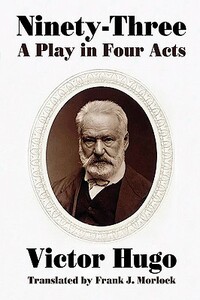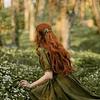Take a photo of a barcode or cover
adventurous
challenging
dark
emotional
reflective
sad
tense
slow-paced
Plot or Character Driven:
A mix
Strong character development:
Yes
Loveable characters:
Yes
Diverse cast of characters:
No
Flaws of characters a main focus:
Yes
Ce roman est une très belle oeuvre de Victor Hugo. Deux forces s'opposent, les royaliste menés pas Le Marquis de Lantenac et les républicains menés par Gauvain, son petit-neveu. Le point culminant de ce livre est la bataille de la Tourgue.
Victor Hugo explore ici tous les points de vue possible. Il parle autant des crimes des monarchistes que ceux des républicains. Il parle même de l'opposition qu'il peut y avoir entre les républicains eux-même. Le meilleur exemple serait le dialogue final entre Gauvain et Cimourdain.
C'est un très bon livre qui est en lien avec d'autres livres que j'ai lu dernièrement comme entre autre Ange Pitou d'Alexandre Dumas ou les Chouans de Honoré de Balzac.
Victor Hugo explore ici tous les points de vue possible. Il parle autant des crimes des monarchistes que ceux des républicains. Il parle même de l'opposition qu'il peut y avoir entre les républicains eux-même. Le meilleur exemple serait le dialogue final entre Gauvain et Cimourdain.
C'est un très bon livre qui est en lien avec d'autres livres que j'ai lu dernièrement comme entre autre Ange Pitou d'Alexandre Dumas ou les Chouans de Honoré de Balzac.
sad
tense
slow-paced
Plot or Character Driven:
Character
Strong character development:
Yes
adventurous
emotional
reflective
fast-paced
Plot or Character Driven:
A mix
Strong character development:
Yes
Loveable characters:
Yes
Diverse cast of characters:
Yes
Flaws of characters a main focus:
No
Victor Hugo is once again an artist painting vivid landscapes involving beautiful poignant scenes of the war of the republic in France. There is no white or black- but nobility and virtues on both sides- as well as quite a few poignant and lengthy speeches on virtue, honor and duty. A good read- but not a fast one.
Classics are hard to review, because so many have read, analyzed, and reviewed them that it is hard to say anything new, and anything intelligent or entertaining that you do say will not only have been said before, but will have probably been said better or more concisely by someone with more expertise.
Having said that, my goal over the last 2 years has been to put my thoughts to paper on everything I read, even if it means just writing a short blurb. What I have to say about Ninety Three can be summed up with: this was my second reading of the novel and the second time I was completely blown away by the writing and themes.
Victor Hugo is a master of words and style. Everything he says about his characters (and everything they say) and setting is done in such a romantic style, and done so cleverly. I can only imagine how great it would be in its original language, and how hard it must have been to create a translation that tries to do it justice. A few random and short highlights (I marked up so much in this I can’t rank them easily):
A sailor struggling against a loose cannon:
The themes are universal and timeless as they cover essential questions like “what is it to be human?” and “what is good?”. After reading this, one might need to take a break from popular fiction or modern writing, because after seeing how ambitious and masterful he is in writing on these essential themes, other works will seem to have less purpose.
The backdrop for the themes is the French Revolution, and the story revolves around a Royalist fighting to preserve the past with the Counter Revolutionaries and two Revolutionaries fighting for the future, one being a leader and the other a commander. All of the parties are familiar with each other from their pasts, and also alike in their devotion to their ideals. What happens when all of their ideals come to a clash in a “very human arena” involving the atrocities of war that always surround revolutions? Ninety Three tells this story in a remarkable fashion.
With all Hugo novels, you get the historical fiction sections. This is where Hugo dives deep into analysis of historical events, people, or places and provides his political and philosophical commentary on them while also tying them to the plot at hand (albeit, very slowly). In this novel we get thoughts on historical figures Danton, Robespierre, and Marat, thoughts on the events that took place in and the actual setting of the National Convention, descriptions and importance of the forests of the Vendee, and like in many Hugo novels, the guillotine and it’s meaning/usage. There is a lot to like about these passages, but they can be quite distracting to the plot. I personally enjoyed them more this second time around in reading because in the 9 year gap between reads I read a lot more about the French Revolution and its history, including recent reads of Americans dealing politically with France during this time (e.g., James Monroe, Adams, Jefferson, etc.).
So fight through the historical commentary if that’s what you have to do (although for me, it was not a great fight) to get through this work, because this is an epic classic; it makes you think (go through the interrogatory with Gauvain) and inspires you to be the best you can be which is the very purpose of great art.
Having said that, my goal over the last 2 years has been to put my thoughts to paper on everything I read, even if it means just writing a short blurb. What I have to say about Ninety Three can be summed up with: this was my second reading of the novel and the second time I was completely blown away by the writing and themes.
Victor Hugo is a master of words and style. Everything he says about his characters (and everything they say) and setting is done in such a romantic style, and done so cleverly. I can only imagine how great it would be in its original language, and how hard it must have been to create a translation that tries to do it justice. A few random and short highlights (I marked up so much in this I can’t rank them easily):
A sailor struggling against a loose cannon:
“Suddenly it leaped towards him. The man dodged. Then the struggle began,—a contest unheard of; the fragile wrestling with the invulnerable; the human warrior attacking the brazen beast; blind force on the one side, soul on the other.”
"Pilot, where are we?" said the captain.
"On the Minquiers."
"On which side?"
"On the worst one."
"What kind of bottom?"
"Small rocks."
"Can we turn broadside on?"
"We can always die."
“He who saves the wolf kills the sheep; he who sets the vulture's wing is responsible for his talons.”
“Revolution is devoted to its fatal work. It mutilates that it may save. What! can you expect it to take pity on the virus? Would you have it merciful to poison? It will not listen.”
“Behind the cloud that casts the shadow is the star that sheds the light. We can no more escape the light than the shadow. Gauvain was undergoing an interrogatory. He had been arraigned before a judge. An awe-inspiring presence. His own conscience.”
“When he who is guilty acknowledges his fault, he saves the only thing worth saving—honor."
The themes are universal and timeless as they cover essential questions like “what is it to be human?” and “what is good?”. After reading this, one might need to take a break from popular fiction or modern writing, because after seeing how ambitious and masterful he is in writing on these essential themes, other works will seem to have less purpose.
The backdrop for the themes is the French Revolution, and the story revolves around a Royalist fighting to preserve the past with the Counter Revolutionaries and two Revolutionaries fighting for the future, one being a leader and the other a commander. All of the parties are familiar with each other from their pasts, and also alike in their devotion to their ideals. What happens when all of their ideals come to a clash in a “very human arena” involving the atrocities of war that always surround revolutions? Ninety Three tells this story in a remarkable fashion.
With all Hugo novels, you get the historical fiction sections. This is where Hugo dives deep into analysis of historical events, people, or places and provides his political and philosophical commentary on them while also tying them to the plot at hand (albeit, very slowly). In this novel we get thoughts on historical figures Danton, Robespierre, and Marat, thoughts on the events that took place in and the actual setting of the National Convention, descriptions and importance of the forests of the Vendee, and like in many Hugo novels, the guillotine and it’s meaning/usage. There is a lot to like about these passages, but they can be quite distracting to the plot. I personally enjoyed them more this second time around in reading because in the 9 year gap between reads I read a lot more about the French Revolution and its history, including recent reads of Americans dealing politically with France during this time (e.g., James Monroe, Adams, Jefferson, etc.).
So fight through the historical commentary if that’s what you have to do (although for me, it was not a great fight) to get through this work, because this is an epic classic; it makes you think (go through the interrogatory with Gauvain) and inspires you to be the best you can be which is the very purpose of great art.
This seems to be a favorite novel of Hugo's for a lot of people, but I cannot say the same.
Unless you are incredibly knowledgeable about all aspects of the French Revolution including major and minor players across the board, a lot of this book loses meaning. Hugo goes off on incredible tangents, and some full pages are just lists of names of people in Tribunals. I have a fairly good knowledge of the Revolution, and most of it went over my head and didn't add anything to the story.
When Hugo was writing about his actual characters, his prose was beautiful, and some paragraphs were such gems that it made reading the entire novel worth it. However, I cannot put this book in the same league as Notre Dame de Paris, for example, which took my breath away with his philosophies as well as the epic tale. I only connected to the characters of ninety-Three at the very end.
Overall, if you're a major fan of Hugo like I am, worth the read, but don't have the highest of expectations.
Unless you are incredibly knowledgeable about all aspects of the French Revolution including major and minor players across the board, a lot of this book loses meaning. Hugo goes off on incredible tangents, and some full pages are just lists of names of people in Tribunals. I have a fairly good knowledge of the Revolution, and most of it went over my head and didn't add anything to the story.
When Hugo was writing about his actual characters, his prose was beautiful, and some paragraphs were such gems that it made reading the entire novel worth it. However, I cannot put this book in the same league as Notre Dame de Paris, for example, which took my breath away with his philosophies as well as the epic tale. I only connected to the characters of ninety-Three at the very end.
Overall, if you're a major fan of Hugo like I am, worth the read, but don't have the highest of expectations.
dark
informative
reflective
slow-paced
Plot or Character Driven:
Plot
Strong character development:
No
Loveable characters:
Yes
Diverse cast of characters:
No
Flaws of characters a main focus:
Yes
dark
emotional
reflective
medium-paced
Plot or Character Driven:
A mix
Strong character development:
Yes
Loveable characters:
Yes
Diverse cast of characters:
No
Flaws of characters a main focus:
Yes




